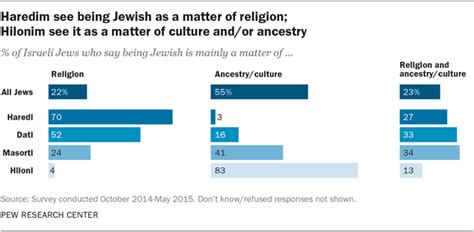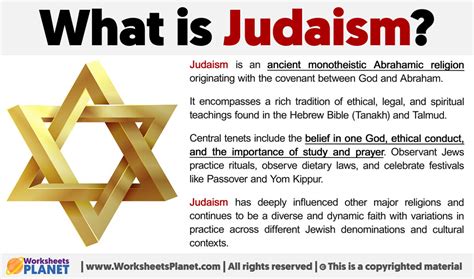Is Jewish A Religion Or Nationality

The question of whether Jewish is a religion or nationality is complex and has been debated for centuries. The answer depends on how one defines these terms and the context in which they are used. To understand the nuances of this issue, it's essential to delve into the history, culture, and identity of the Jewish people.
Historical Context: The Evolution of Jewish Identity

Historically, the Jewish people have been identified by their religious beliefs and practices, which are rooted in the Torah and the Talmud. The Jewish faith is one of the oldest monotheistic religions, with a rich tradition of rituals, customs, and laws that guide the daily lives of its adherents. However, Jewish identity extends beyond religious affiliation, encompassing a shared culture, language, and history that have been shaped by the experiences of the Jewish people over time.
Religious Aspects of Jewish Identity
From a religious perspective, Judaism is a faith that is based on the belief in one God and the adherence to the commandments and laws outlined in the Torah. Jewish religious practices include the observance of the Sabbath, the celebration of holidays such as Passover and Yom Kippur, and the adherence to dietary laws known as kashrut. The religious aspects of Jewish identity are central to the lives of many Jews, providing a sense of community, purpose, and connection to a larger tradition.
| Religious Practice | Description |
|---|---|
| Sabbath Observance | Rest and worship on the seventh day of the week |
| Holiday Celebrations | Observance of festivals such as Passover, Sukkot, and Hanukkah |
| Kashrut | Adherence to dietary laws that distinguish between permissible and forbidden foods |

Nationality and Ethnicity: The Complexity of Jewish Identity

Beyond its religious dimensions, Jewish identity also encompasses a sense of nationality and ethnicity. The concept of a Jewish nation or people is rooted in the historical experience of the Jewish community, which has maintained a distinct cultural, linguistic, and ethnic identity despite centuries of diaspora and persecution. The establishment of the State of Israel in 1948 added a new layer of complexity to Jewish identity, as it created a territorial homeland for the Jewish people and raised questions about the relationship between Jewish nationality and citizenship.
Cultural and Linguistic Aspects of Jewish Identity
Jewish culture is rich and diverse, reflecting the many different communities and traditions that have developed over time. Jewish languages, such as Yiddish and Ladino, have played a significant role in shaping Jewish identity, as have literary and artistic traditions that reflect the experiences and perspectives of Jewish communities around the world. The cultural aspects of Jewish identity are deeply intertwined with its religious and national dimensions, creating a complex and multifaceted whole.
Key Points
- Jewish identity encompasses both religious and national dimensions, reflecting the complex history and culture of the Jewish people.
- The religious aspects of Jewish identity are centered on the belief in one God and the adherence to the commandments and laws outlined in the Torah.
- Jewish nationality and ethnicity are rooted in the historical experience of the Jewish community, which has maintained a distinct cultural, linguistic, and ethnic identity despite centuries of diaspora and persecution.
- The establishment of the State of Israel in 1948 added a new layer of complexity to Jewish identity, raising questions about the relationship between Jewish nationality and citizenship.
- Jewish culture is rich and diverse, reflecting the many different communities and traditions that have developed over time.
In conclusion, the question of whether Jewish is a religion or nationality is not a simple one, as Jewish identity encompasses a complex and multifaceted whole that reflects the dynamic and evolving nature of human culture and experience. By recognizing the many different perspectives and traditions that exist within the Jewish community, we can gain a deeper understanding of the richness and diversity of Jewish identity.
What is the significance of the Torah in Jewish identity?
+The Torah is the central text of the Jewish faith, outlining the commandments and laws that guide the daily lives of Jews. It is considered the word of God as revealed to the Jewish people and is studied and observed by Jews around the world.
How has the establishment of the State of Israel impacted Jewish identity?
+The establishment of the State of Israel in 1948 added a new layer of complexity to Jewish identity, raising questions about the relationship between Jewish nationality and citizenship. It has also created new opportunities for Jewish self-expression and community-building.
What role does culture play in shaping Jewish identity?
+Culture plays a significant role in shaping Jewish identity, reflecting the many different communities and traditions that have developed over time. Jewish languages, literature, and art have all contributed to the rich and diverse cultural heritage of the Jewish people.
Meta Description: Explore the complexities of Jewish identity, encompassing both religious and national dimensions, and discover the rich cultural heritage of the Jewish people. (149 characters)